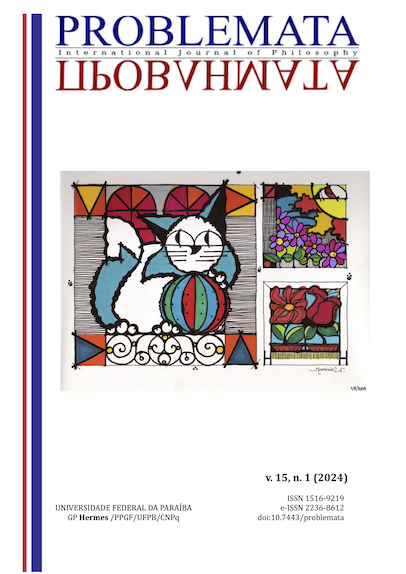VIRTUE AND VICE AS COMPETING FACTORS IN PUBLIC INTEREST
DOI:
https://doi.org/10.7443/problemata.v15i2.69752Keywords:
virtue, vice, public interest, morality, social justiceAbstract
This article addresses the issue of "virtue and vice as competing factors in public interest" and is grounded in Mandeville's "The Fable of the Bees or Private Vices, Public Benefits," analyzing the complexities of social relations and the origins of societies based on individual needs. Thinkers such as Plato, Aristotle, Hume, Smith, Dumont, Rawls, and Manzoni were explored, revealing the predominance of material needs over social relations in contemporary society, emphasizing the importance of education and altruism for the common good. The methodology included careful reading of the mentioned works, aiming to understand the competition between virtue and vice in public interest. The objective was to analyze this dynamic in current society, considering different philosophical perspectives and ethical challenges. The central issue addressed the relationship between individuals, material goods, and personal relations, highlighting the paradigm shift between ancient and modern times. Mandeville seems to define virtue as action that indirectly benefits society through private vices, being the intriguing point of his thought, emphasizing the moral complexity of social interactions and the price of justice that consists of the constant pursuit of social equality.
Downloads
References
ARISTÓTELES. Ética a nicômaco. Tradução de António de Castro Caeiro. 6. ed. Lisboa: Quetzal Editores, 2018.
ARISTÓTELES. Política. Tradução de Mário da Gama Kury. 3. ed. Brasília: Editora Universidade de Brasília, 1997.
DUMONT, Louis. Homo aequilis: gênese e plenitude da ideologia econômica. Tradução José Leonardo Nascimento. Bauru, SP: EDUSC, 2000.
HAIDT, J. A mente moralista: por que pessoas boas são segregadas por política e religião. Tradução Wendy Campos. Rio de Janeiro: Alta Books, 2020.
HUME, D. Hume - Vida e Obras in Col. Os Pensadores. Tradução Editora Nova Cultural Ltda. São Paulo: Nova Cultural, 1999.
KANT, E. Sobre a pedagogia. Tradução João Tiago Proença. Lisboa: Edições 70, 2020.
KELSEN, H. O que é a justiça? A justiça, o direito e a política no espelho da ciência. Tradução Luís Carlos Borges. 3. ed. São Paulo: Martins Fontes, 2001.
KUIPER, R. Capital moral: o poder de conexão da sociedade. Tradução Francis Petra Janssen. Brasília, DF: Editora Monergismo, 2019.
MACINTYRE, A. Depois da Virtude: um estudo sobre teoria moral. Tradução de Pedro Arruda e Pablo Costa. Campinas, SP: Vide Editorial, 2021.
MANDEVILLE, Bernard. A Fábula das abelhas: ou vícios privados, benefícios públicos. Tradução Bruno Costa Simões. São Paulo: Editora Unesp, 2017.
MONZANI, Luiz Roberto. O desejo e prazer na idade moderna. Campinas, SP: Editora da UNICAMP, 1995.
PLATÃO. A República. Tradução e notas de Maria Helena da Rocha Pereira. 11. ed. Lisboa: Fundação Calouste Gulbenkian, 1949.
RAWLS, J. Justiça e democracia. Tradução Irene A. Paternot. 2. ed. São Paulo: Editora WMF Martins Fontes, 2022.
RAWLS, J. O Liberalismo político. Tradução de João sedas Nunes. Lisboa: Editorial Presença, 1996.
RAWLS, J. Uma teoria da justiça. Tradução de Carlos Pinto Correia. Lisboa: Editorial Presença, 2017.
SMITH, Adam. The theory of moral sentiments. Works: [s.n.], 1963.
VINER, Jacob. The role of providence in the social order: na Essay in Intellectual History. Philadelphia: [s.n.], 1972.
Downloads
Published
Issue
Section
License
Copyright (c) 2024 Garcia Matondo Vita Bige

This work is licensed under a Creative Commons Attribution 4.0 International License.
Authors who publish with this journal agree to the following terms:
- Authors retain copyright and grant the journal right of first publication with the work simultaneously licensed under a Creative Commons Attribution License that allows others to share the work with an acknowledgement of the work's authorship and initial publication in this journal.
- Authors are able to enter into separate, additional contractual arrangements for the non-exclusive distribution of the journal's published version of the work (e.g., post it to an institutional repository or publish it in a book), with an acknowledgement of its initial publication in this journal.
-
- Authors are permitted and encouraged to post their work online (e.g., in institutional repositories or on their website) prior to and during the submission process, as it can lead to productive exchanges, as well as earlier and greater citation of published work (See The Effect of Open Access).





